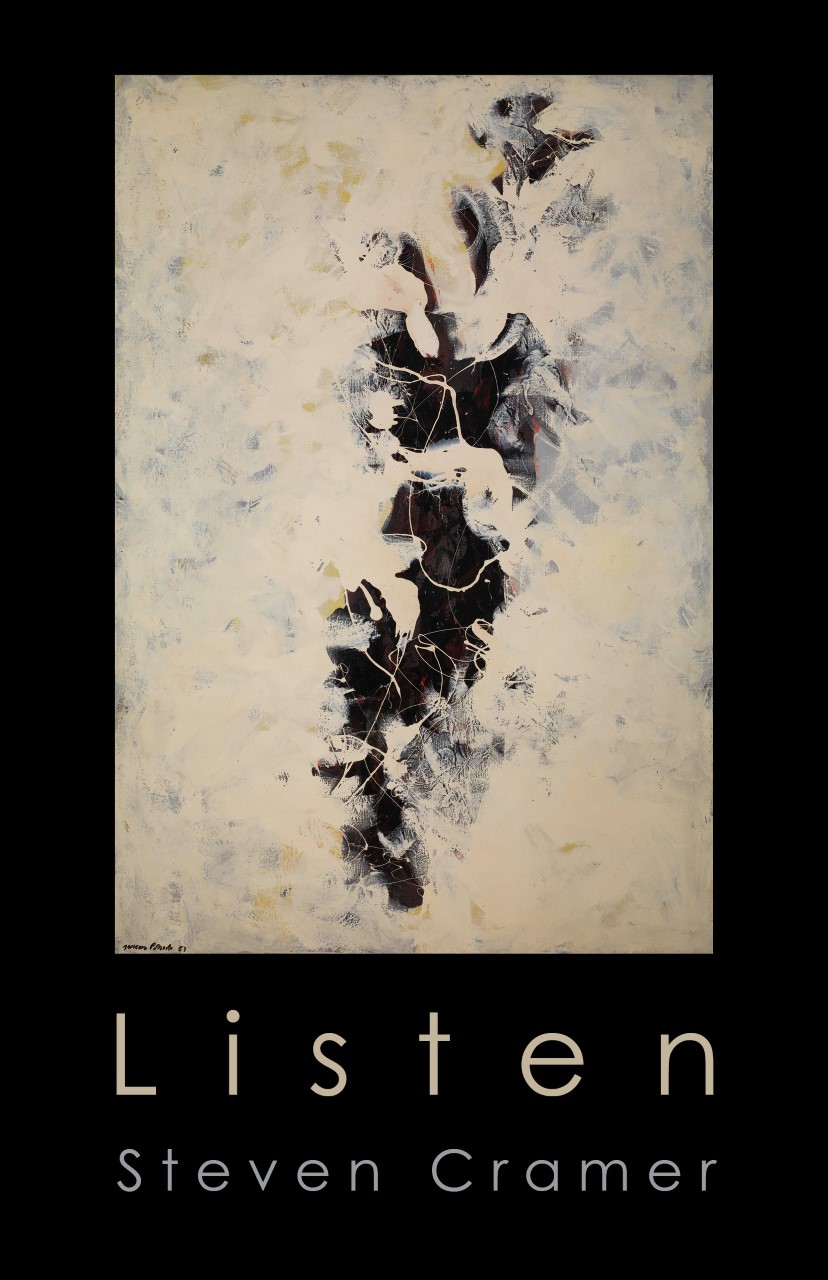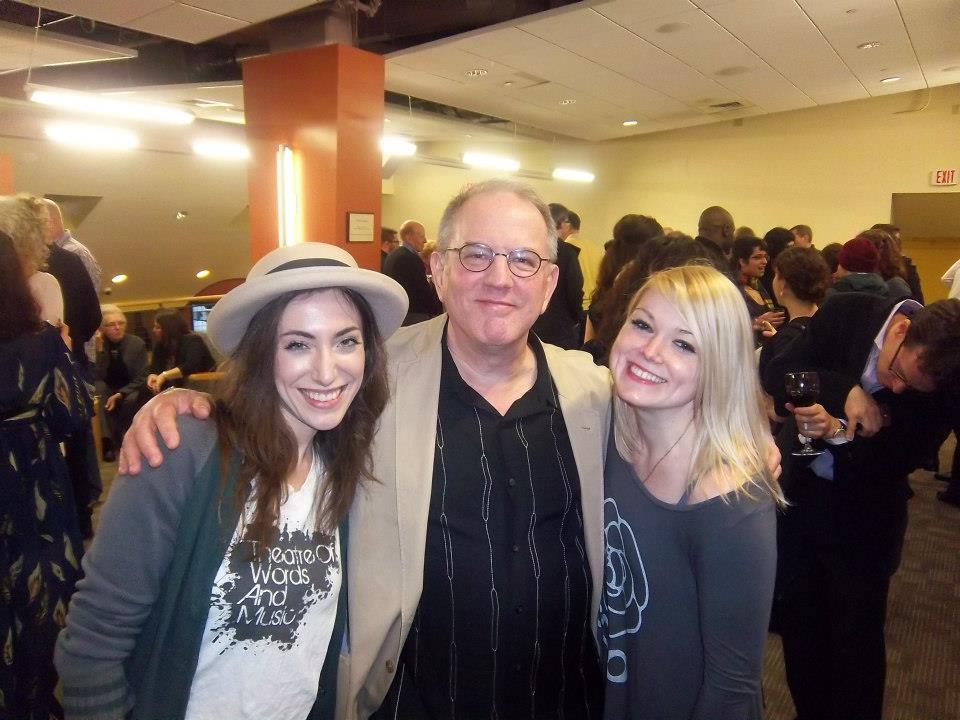At Cambridge Common Writers, we love to celebrate the achievements of our wonderful community. Poetry MFA Writing Faculty Steven Cramer’s latest poetry collection, Listen, was named a “Must Read” by the Mass Book Awards (along with When My Body Was A Clinched Fist by Enzo Silon Surin (Poetry, 2012)!). Alum Robbie Gamble (Poetry/Nonfiction, January 2017/June 2020) spoke with Steven about shifting between poetry projects, metaphors, and the crucial pleasure of reading.
Robbie Gamble: Reading your new poetry collection Listen, I’m struck by the contrast to your previous collection, Clangings, which seemed a more tautly constructed series of persona poems making a deep dive into the intricate language of psychosis, while in this book you range more broadly in terms of voice, subject matter, and form. Did you have to make a big conscious effort to shift poetic gears between books? Or did one project flow out of the other?
Steven Cramer: The route from Clangings to Listen did have some unanticipated potholes and speed bumps—which eventually, and paradoxically, smoothed the way. Clangings—a “project book” in the current terminology—arrived unbidden, interrupting the poem-after-poem process I’d always known as “writing.” After the two years it took to complete, the dissociative thinking that drove its speaker had had its say. While I didn’t want to run for cover to ground gone over, I still had earlier poems I thought belonged in a book. Then a new unsuspected thing arrived: prolonged depression. Like nearly all writers I know, I’d written through, or around, that “element of blank” (Dickinson), but never as far into it as now seemed required. Listen begins with poems provoked by that experience. The other sections respond, however obliquely, to the dreadful national period from 2016 to 2020; and then the book does indeed run for cover, into art and homage. “Range” sounds like a good verb for Listen’s behavior, but I also hope there’s a through-line: from the (under)ground up.
The debate between variety and consistency intrigues me, but mostly as it relates to style. Reading a book of poems, I almost always prefer formal and tonal variation. Our subjects choose us, I think, and so don’t really brook much debate. A friend once said this to me: subject matter is for wimps. He was joking, sort of, but I think I get the import of his joke. What a poem is “about”—or, Lord help us, “should” be about—has become complex and even contentious, don’t you think?
RG: I’d love to return to that “element of blank,’ but for the moment I would like to say that I come down enthusiastically on the side of variety. I remember you once citing Philip Larkin saying something to the effect that a book of poems should be like a vaudeville show: say, a ragtime intro, then a comedy sketch, a bearded lady, doves and card tricks, a comely assistant sawn in two. There’s something about shifting the tonal ground beneath our feet that makes it possible for a reader to bear the dark corners you peer into in a poem like “Bad” or “The World.” We know we may well be dragged back into that kind of darkness, but meanwhile we get transported on tragicomic detours through Costco and New Zealand, nesting penguins and the Incredible Shrinking Everyman, to shift our mood.
SC: One phrase, out of many, that strikes me in your comments is “tragicomic detours.” Although I love many poets who steer clear of humor—not many laughs in Rilke, though the posthumous speaker of “Requiem for the Death of a Boy” gets off one hilarious line: “. . .And mother, who was the dog/really?”—I couldn’t write poetry without poking fun at myself. I mean, who do I think I am? More seriously, humor makes us vulnerable, and vulnerability requires self-interrogation—as in: who do I think I am?
The more I think about subject matter, the more I care about tone. Lyric poems often have no single, paraphrasable subject—“The Snowman?” “I felt a Funeral in my Brain?”—but a successful lyric poem moves me, in large part, by means of its tone; or in many cases, tones. In writing, this approach puts on offer a wider range of verbal alternatives—image, abstraction, meter, rhythm, irony, understatement, invective; you name it—and helps subvert that “predetermined design” you mention. My attraction to a poem’s manner of speaking may lie behind those English versions I’ve made of poems from other languages—which, except for ein bisschen Deutsch, I don’t read. I’m sure “my” Mandelstam sounds nothing like his originals, but the experiment opened up intonations otherwise unavailable. I recently did what I call a “derangement” of Rimbaud’s gleefully potty-mouthed “The Poet at Seven.” That was a trip!
RG: Well, that’s a derangement I’d love to experience! And I note that you return to this business of adaptation in Listen, not only in the Mandelstam sequence, but later adapting Eugenio Montale in “En Route” and then closing out the book with your take on Ingeborg Bachmann with “Bohemia Lies by the Sea.” Each of these poems is tonally distinct; not typically Cramerian, although I sense that you were in a deep tonal conversation with each of these poets during your adaptation process.
SC: In some respects, my “departures” from other texts pay homage to my teacher, Donald Justice, who wrote a book titled Departures. His methods—and he called them methods—gave me permission to use other texts as provocations for poems. There’s a distinction to be made—not one I’ve thought hard about—between poems “about” writing and poems “about” reading. I don’t object to either, but I especially love the latter; “On First Looking into Chapman’s Homer” is one. I’d like to think that my adaptations honor the crucial pleasure of reading.
RG: I like the word “provocation” as a term for a poem written in response to, or at least in an intentional relationship with, another text. I suppose the act of reading a poem can provoke us in all kinds of different directions: it might affirm something we had never been able to articulate, or throw down an unexpected new perspective on some oddball facet of the world, or cause us to scramble for an argument because we disagree with the poem’s premise, or simply piss us off.
But I want to return to what you call “the crucial pleasure of reading.” It strikes me that many of the poems in Listen are “poems ‘about’ reading,” at least in part. In addition to your Mandelstam/Montale/Bachmann provocations, you also draw on Tomaž Šalamun, Boswell, Tolstoy, Dickinson, Naomi Klein, Adam Smith, Wayne Brown, and others, and it’s so evident that you read both broadly and deeply. Is reading an essential form of listening? Could you talk more about how your reading practice enriches your writing practice?
SC: The best essay I know of that equates reading with listening is Louise Glück’s six-paragraph admonishment, “Disinterestedness.” I return to it whenever I forget that literature is a window, not a mirror (or if my laziness just needs a slap). Reading, like writing, is a pleasure demanding labor. Do you know this beautiful little poem by William Meredith?—
"A Major Work" Poems are hard to read Pictures are hard to see Music is hard to hear And people are hard to love But whether from brute need Or divine energy At last mind eye and ear And the great sloth heart will move.
The great sloth heart!
I guess my reading enriches my writing primarily because I invite it to do so. Only once, with Clangings, did a writing project require reading as preparation. I tried my best to acknowledge the examples of clang associations I relocated from my research into a poem, but I did wander into a state of mental osmosis between what I read and what I wrote, my brain a kind of semipermeable membrane! Of these two tongue-twisters—totalitarianism’s/tell-liar-isms and nitroglycerine/triglycerides—I wrote one in response to reading the other, don’t recall which was which, but used them both. The wonderful liberation of the Clangings project allowed scores of my own orphaned fragments of language—the boy/who spotted the viper winking//but won’t say—to find a place in that dysfunctional family of poems.
A recent poem praises reading in a particularly frontal way: “Rereading Tranströmer During a Pandemic.” Tranströmer’s exemplary life as a healer lies behind this poem, but rereading him during the early days of Covid’s house arrest also ministered to me because of his unfettered imagination. What he says about small children in his great “Vermeer” applies to his own poems: “There aren’t any walls for them.”
Metaphorical language conveys perceptions, intuitions, and emotions close to the edge of the sayable. Sometimes the metaphor lives on “our” side of that edge—Douglas Dunn’s my youth was as private as the bank at midnight—so we can paraphrase its surprise and aptness, and perhaps even reverse engineer its example for our own writing. Other times, the metaphor ventures so close to that edge it may cross over into the ineffable. Craig Raine’s a glinting beetle on its back/struggled like an orchestra//with Beethoven is a witty example of getting closer to the edge: you’d need more words to describe how the figure works; but more relevantly, Raine’s simile registers, to me at least, as an all but innate turn of mind, not just an item from the poet’s toolkit. I love both metaphors. About Dunn’s, I think: how might I do a version of that? About Raine’s, I wonder, what sort of mind can see the world that way?
Just maybe—I’m thinking this up while I think it—a metaphor needs to leave wit behind to cross over completely into the Land of the Unsayable. Many have responded with great sensitivity to “I felt a funeral in my brain”—one from thousands of similar dislocations by Dickinson—but no one I know of has fully accounted for its effect. Inarguably figurative, a “funeral in the brain” doesn’t oblige generic classification—a metonym? a synecdoche? —and even the simpler diction refracts like a prism: does felt denote an emotion or a tactile experience? In my own best stab, “funeral” functions metaphorically as vehicle for a suppressed tenor, which we intuit to be some kind of emotional or psychological or spiritual malady. The poem refuses to diagnose, but scrupulously extends—from service to burial—that untethered vehicle. Rigorous indeterminacy: one needs an oxymoron to approximate Dickinson’s genius.
RG: Holding on to your thread of metaphor, I’m going to circle back to the wonderful line you cited from Tranströmer: “There aren’t any walls for them.” Reading through Listen, it strikes me that there aren’t any walls for you, either, as you move through these wide-ranging poetic spaces. Or if there are walls that have accumulated from our adult experience, they are yet thin enough that you can invite the reader to put an ear up to them and make out the voices in the rooms beyond: Mandelstam’s exile, the effect of your son singing in the shower, your own interior monologues confronting “the element of blank” at the nadir of depression, fragments of Emily Dickinson in flakes of falling snow. And that, to me, is the gift of this book: that you have helped us to listen more intently and more precisely, to discern amid the chaff and static a trove of compelling fresh insights into how we are human.
SC: It’s hard not to get a little gushy about your kind comments! I love the idea that poetry satisfies (in a benign way) the impulse to listen in on what’s happening in the next room. A poem is very often overheard. My dear friend and terrific poet Joyce Peseroff defines poetry as “one interior life speaking to another.” That definition might require periodic amendments, especially as poetry strives to represent more specific and more inclusive communities, and as poets find new ways to collaborate. So it might help to limit Joyce’s definition to lyric poetry—a single instance of which can affect many, but doing so one reader or listener at a time. That dialogue between poet/poem and audience of one seems to me a central social benefit lyric poetry affords. It reinforces what neurobiologists claim is an essential adaptive function of human consciousness: “theory of mind”—the intuitive telepathy we use to cooperate with one another (at least when we’re on our best behavior). It’s not the most receptive historical period to credit notions of a “human nature” common to everyone, transcending chosen or imposed identities; but any insight into how we’re human presupposes that we share some fundamental traits, for good and for ill. Lyric poetry says I feel that too. And then, of course, there’s the lyre behind the lyric. I read somewhere that our ancestors’ vocal equipment could have permitted singing before we developed speech. Maybe we crooned or cooed before we cursed. A heartening conjecture.





Comments are closed